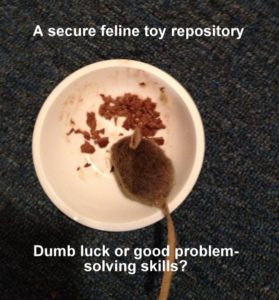 Do animals think about thinking? Do they ponder the best way to solve a particular problem? For those who study animal behavior, the answer is a no-brainer. Of course they do! Those people then will describe examples that proved this to their satisfaction.
Do animals think about thinking? Do they ponder the best way to solve a particular problem? For those who study animal behavior, the answer is a no-brainer. Of course they do! Those people then will describe examples that proved this to their satisfaction.
One such example involved how Kip solved the problem of where to park a favorite toy in his multi-cat household. Superficially his food dish would seem the worst place to leave such a treasure. But Kip possessed 2 pieces of information the casual observer did not. He knew that democracy ruled relative to toys in his home: Any cat could play with any toy found anywhere in the house. Second, he knew that feline food dishes were sacred: A cat could not steal food from another cat’s dish.
The cat’s ability to summon and connect these two pieces of information allowed him to formulate a viable, energy-efficient solution to his problem. When he finished playing with the toy, he parked it in his food dish for safe-keeping.
But regardless how much such evidence exists in the real world, it carries no weight in the scientific community. To gain credibility there, a concept such as metacognition–or the ability to think about how to solve a problem–must be proven scientifically. In their study of semi-wild rhesus monkeys discussed in this podcast, researchers Alexsandra Roseti and Laurie Santos take the concept of animal metacognition one step closer to acceptance.
I urge those of you interested in this aspect of animal mental capacity to read the researchers’s article, complete with excellent illustrations and photos, here.
Podcast: Play in new window | Download
Subscribe: Apple Podcasts | RSS | More